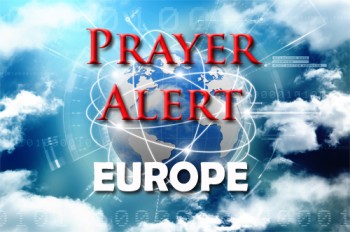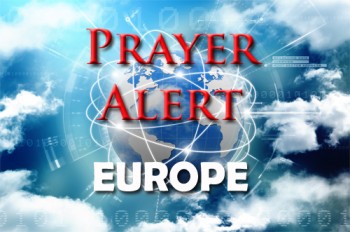Displaying items by tag: Spain
Canary Islands volcano danger growing
Lava from the Cumbre Vieja volcano, which has been erupting for four weeks, has destroyed even more homes and buildings. The two new vents that opened last week have partially collapsed, causing lava to flow in multiple directions. The local airport was closed again for two days and 800 more homes were evacuated as rapid flows of molten lava moved towards them, bursting homes into flames. There were 64 more seismic movements recorded, the strongest measuring 4.1. There are no signs of eruptions and earthquakes stopping soon. Over 1,100 buildings and 600 hectares of land had been destroyed by 13 October, and the next day the lava flows expanded again with even more evacuations ordered in three more areas.
Canary Islands volcano ‘much more aggressive’
The Canary Islands volcano has blown open two more fissures, and intense activity has worsened, three weeks after the original eruption. The prompt evacuation of more than 6,000 people since the 19 September eruption helped prevent casualties. By 3 October the lava had destroyed or partially destroyed 1,000+ buildings, including homes and farming infrastructure. By 7 October it had destroyed 21 miles of roads and entombed large areas of land, with no indication of lessening.
Spain: update on La Palma volcano
Lava from La Palma’s volcano has now reached the Atlantic Ocean. When this happens there is a chemical reaction as hot lava boils the colder sea water. Volcanologist Dr Robin Andrews said, ‘It creates a steam of hydrochloric acid, water vapour and bits of ash. Volcanic explosions are possible because lava entering sea water creates a pressure-cooker situation that throws out volcanic debris.’ Authorities have set up an exclusion zone around the lava, including in the sea, to keep people away from any potential danger. Three coastal villages are now locked down. Please continue to pray for the hundreds of families whose homes were destroyed by lava, the 6,000+ evacuated people, the owners of destroyed banana plantations and businesses, and the pupils and parishioners of destroyed schools and a church. Authorities declared La Palma a disaster zone. Pray there will be enough financial support for everyone affected.
Spain: Canary Islands volcano eruption
A volcano on the island of La Palma began erupting on 19 September, sending streams of lava and plumes of smoke and ash into the air. A small earthquake preceded the eruption, causing thousands of residents to flee their homes and prompting authorities to begin evacuating the infirm and farm animals from nearby villages before the volcanic activity. By 20 September three streams of lava were pouring down towards the sea, moving at 2,300 feet per hour, and 6,000 people had evacuated their homes. Two days later new cracks started spewing more lava and four earthquakes shook the area. Families raced to save what they could from their homes in a two-hour window granted by emergency workers. The lava had already destroyed 300 homes, and overwhelmed roads, farms, a school, and swimming pools. Pray for those in temporary shelters not knowing when they will return home, fearing their homes might be engulfed by lava. Seismologists played down the attendant risk of an Atlantic tsunami.
Spain: Europe's vegetable garden - poverty and plastic
Andalusia in Spain attracts foreigners flocking to beautiful beaches, and migrants flocking to harvest fruit and vegetables. While holidaymakers stay at expensive apartments, hundreds of fruit-pickers live in poverty-stricken, plastic shantytowns. ‘People come and say they are going to save us,’ says Ayoub. ‘They take our picture, but nothing changes. Nothing is ever going to change.’ 600 immigrants live in hovels, dust alleys are strewn with garbage, a dried-up riverbed is the toilet, and electricity is stolen from overhead lines. Ayoub works in hot greenhouses sprawling for miles, unseen by tourists enjoying long lunches, blissfully unaware of the harsh reality behind their salads.
Portugal: drug trafficking
A 79-year-old Spanish woman has been arrested in Portugal over suspicions of leading a drug ring. The 78-year-old woman, who was heading a smuggling group, was arrested in Vila Real, in northern Portugal, along with two other Spaniards, aged 26 and 60, as part of an operation carried out by Spanish and Portuguese police. They were bringing in cocaine through Portuguese ports using a legal company importing coral from the Dominican Republic. The woman was the head of the group as well as the manager and owner of the front company. The group was a wholesaler for other traffickers who then sold the cocaine on the black market in southern Spain.
Spain: migrants swim from Morocco
Thousands of migrants have swum into the Spanish enclave of Ceuta after border controls were relaxed in Morocco. In 24 hours, 6,000 people had paddled in inflatable boats, swum with rubber rings, or walked through the shallows at low tide. 1,500 were thought to be teenagers. Spanish troops were deployed to Ceuta to patrol the border. Moroccan migrants have crossed land and sea borders to Spain by the hundreds for weeks. Adults were transferred to a football stadium and returned to Morocco, minors went to an industrial building. Spanish / Moroccan tensions are high after the leader of the Polisario Front, Brahim Ghali, was admitted to a Spanish hospital without informing Morocco. The Polisario Front fights for the independence of Western Sahara and contests all Morocco's claims. Many believe lax Moroccan border control, facilitating easy access to Spain, was in retaliation for Spain treating Brahim Ghali.
Spain / Greece: extreme weather
Deep snow left by Storm Filomena turned to ice, disrupting transport and lowering temperatures to -25C (-13F). The elderly are warned to stay at home. At least seven people have died due to the weather. ‘We are going to have this cold for a few more days, but we all pull together’, Yoli Asensio said, ‘Day-to-day life is difficult, access to homes and roads are blocked.’ There were 1,200 fracture cases in one day, caused by accidents on the ice - an average of fifty an hour. 1,300 snow-clearing vehicles managed to push snow off 12,100km of roads, to keep them ice-free. In contrast, Greece is basking in unusually warm weather, with Athens recording temperatures of 23C (73.4F) - the average January temperature is 10C.
Spain: lions have coronavirus
Four lions at Barcelona Zoo have tested positive for coronavirus after being given Covid tests when a zookeeper noticed they were displaying suspicious symptoms. The lions were familiar enough with the zookeepers to allow them to swab their noses and mouths in the same way that humans are tested. Although it is not yet known how the lions contracted Covid, two human staff at the zoo have also tested positive. The zoo has contacted its counterparts at the Bronx Zoo in New York, where the first confirmed cases of Covid in large cats was reported. They all recovered. There have been cases of Covid in domestic dogs and cats and large outbreaks among mink around the world. It is not fully known which animals can and cannot contract Covid from contact with infected humans, and no confirmation of animals re-infecting humans.
Spain: strategy to combat online disinformation
Spain's government has a new strategy to tackle the spread of online disinformation. The procedure was approved last month and a special government commission should combat the issue. Madrid said the ongoing coronavirus pandemic is accompanied by an ‘unprecedented infodemic’. Spanish authorities will monitor the internet for disinformation campaigns, investigate their origin, and implement a ‘policy response’ if necessary. This response may take the form of a diplomatic warning if a foreign state is behind such a campaign. The Madrid press association has accepted the government's wish to combat disinformation, but have noted a ‘clear risk’ that the government will act ‘as a censor rather than a guarantor of the truth’.









